The Sullivan-Clinton Campaign-1779
The Groveland Ambush
Sept. 12-14, 1779
The Groveland Ambush
Sept. 12-14, 1779
The third significant engagement during the Sullivan Campaign of 1779 occurred on a rise of ground just west of the southern tip of Conesus Lake near Groveland, N.Y.
September 12, after having marched 11 miles Gen. John Sullivan's army was now camped about one mile from the head of Conesus Lake (south end).
That evening, Gen. Sullivan selected Lt. Thomas Boyd of Morgan's Riflemen to make a scout of the Indian village of Chenussio (also known as Genesee Castle or Little Beard's Town) just outside of present day Cuylerville, N.Y. In a letter to John Jay dated September 30, 1779, Gen. Sullivan wrote "...I had the preceeding evening ordered out an officer with three or four rifle men, one of our guides and an Oneida chief to reconnoitre the Chenesee town, that we might if possible surprise it. Lieut. Boyd of the rifle corps was the officer entrusted, who took with him twenty three men, volunteers from the same corps and a few from Col. Buttler's regiment, making in all twenty six, a much larger number than I had though of sending..."
Lt. Boyd ended up taking approximately 27 men including Oneida chief Hanyost Thaosagwat. The party left at approximately 11:00 in the evening. Gen. Sullivan later wrote "...the guides were by no means acquainted with the country, mistook the road in the night, and at daybreak fell in with a Castle six miles higher up than Chenesee..."
On September 13, Lt. Boyd and his party were now at the Indian village of Gathtsegwarohare, which they found abandoned. Lt. Boyd sent four men back to Gen. Sullivan to report. After they had left, four Indians on horseback rode into the village. Lt. Boyd attacked killing one Indian and wounding another. The wounded Indian and two others escaped. Lt. Boyd's party started back to return to the main body of the army. After a few miles, Lt. Boyd sent two more of his men back to Gen. Sullivan. These men soon returned after sighting five Indians on the path. Lt. Boyd's party began the trip back, came across the five Indians earlier seen and began firing.
As the party continued on in pursuit, Lt. Boyd and his men did not realize that they were about to come in contact with about 400 Indians and Tories lead by Col. John Butler waiting to ambush Gen. Sullivan's army as they approached up a steep hill from Conesus Lake. In hearing Lt. Boyd's men firing, some Indians believed the ambush had begun and fired upon a surveying party that was coming up from Conesus Lake. Col. Butler reported that "...a scout of the Rebels, 30 in number had fallen in with the right of our line..."
As the engagement began, Lt. Boyd's men fought for some time and finally made their way to a small grove of trees. As they were greatly outnumbered, Lt. Boyd and party were soon overtaken.
In hearing the firing, Gen. Sullivan dispatched the Light Corps and flanking divisions of General Hand's 3rd Brigade but they arrived too late. The Indians were already in retreat to the west.
Approximately eight of Lt. Boyd's men escaped (including Timothy Murphy), approximately 14 were killed, and Lt. Boyd and Sgt. Michael Parker were captured. They were marched to Genesee Castle where they were questioned and subsequently put to death.
On September 14, Gen. Sullivan and his army arrived at a deserted Genesee Castle where they found the bodies of Lt. Boyd and Sgt. Parker. It was apparent that they had been tortured "... in the Indian manner..." They were buried with military honors.
It is noted that in 1841, their remains were removed and taken to Mt. Hope Cemetery in Rochester, N.Y.
Below are excerpts from journals as recorded by soldiers who were on the Sullivan-Clinton Campaign relating to the ambush of Lt. Boyd and his party, Although somewhat graphic, they offer great detail and insight into this chapter of the Sullivan Campaign. The last letter is from Col. John Butler (who lead the Tory Rangers) to Lt. Col. Bolton with his account of the ambush.
"March this morning 6 o'Clock and a very heavy Dew on the Grass and the morning very Cold... about 10 o'Clock we heard a few Guns firing in front, the troops was immediately formed and marched over the Inlet of the Lake a very bad morass and Creek and a large hill on the opposite side where we found the Indians who was formed on this hill ... the rifle men rushed up the hill and the enemy made their escape soon as possible leaving behind them their packs and c., which the rifle men got. Our Brigade marched up to the top of the hill and formed the line of battle where we halted till the Army would get over. here one of our men came in wounded who informed us that Lt. Boyd with his party 18 Riflemen and 8 musquet men of our Regt. who was sent last night to reconoiter the next town was entirely cut to pieces."
. "... on entering the town we found the body of Lt. Boyd and another Rifle Man in a most terrible mangled condition. they were both stripped naked and their heads Cut off and the flesh of Lt. Boyd's head was entirely taken of and his eyes punched out. the other mans head was not there. they was stabbed I suppose in 40 Different places in the Body with a spear and great gashes cut in their flesh with knifes, and Lt. Boyd's Privates was nearly cut of and hanging down, his finger and toe nails was bruised of and the dogs had eaten part of their shoulders away likewise a knife was sticking in Lt. Boyd's body. They were immediately buried with the honor of war."
"Marched this morning at 6 o'clock and after gaining the distance of two miles we arrive at the town of Kanaghsas consisting of 11 houses.- make a halt and men turned out to destroy the corn as also the town. A party of riflemen in number 26 under command of Lieut. Boyd with Hanyost and Indian went last night from our last nights encampment to this town to make discoveries. He went to the town where he staid all night, sending off a man to acquaint the General that the town was deserted and not any body there. In the fore part of the day, he for some reason thought fit to return. When he had reached within two miles of the army he was attacked by a number of Indians (Seven of the men got in one of them was wounded) supposed to be about one hundred. On our march this afternoon we found four killed and scalped, the rest supposed to be taken- At the time Maj. Parr being about three quarters of a mile from them. as soon as he heard the firing immediately went on and came so close on them before he was discovered that they left seventy packs on the ground with some arms, but unhappily for Parr they got off. We arrived within about half a mile of the town when the General received intelligence that they were there paraded ready to fight us. It was now sundown, and when we got around the town it was dark, a most disagreeable time for fighting, but getting close into the town found they had left it, we encamped in the town and all necessary caution is taken by the General for the safety of the army."
"... the march begins again and proceed across a plain about two miles and a half wide (some places wider) and to all appearance in length about 12 miles. Not a rise of ten feet through the whole, not a stump on it. a few acres of timber which stands in small groves make it appear much more beautiful. The land cant be equalled. "... When we marched through the plain we came to the Chenesee river, which we ford being about middle deep and the current very strong... "The army all cross and proceed to the town where we arrive at half after five o'clock and encamp around the town. Here we find Lieut. Boyd and one of the men laying
on the ground just on the edge of the town, and so inhumanly murdered it is almost too much to describe. Their heads were cut off and scalped. They had been whipped horribly. Their bodies speared all over and Lieut. Boyd partly skinned. Such is the barbarity of these savage villains. This town is the largest of any we have seen. it consists of one hundred houses and most of them good. This night we live sumptuously on beefsteak and potatoes, as we have got to our journeys end."
"The army marched at 5 o'clock, went into the town where they halted and cooked breakfast, while the pioneers were building bridges and cutting a road through the swamp. Mr. Lodge, a surveyor, with his assistants, without the sentry's rising, advanced up a hill, were fired upon by a party of Indians who lay concealed on the hill for that purpose. One of his men was wounded, the rest made their escape. As Lieut. Boyd was returning to camp this morning he was attacked by a large party of Indians, himself and 16 of his men were killed or taken. One of his party, who made his escape, informed us that this morning in the Genesee town they killed and scalped an Indian who rode a good horse, and had three guns, supposed to be going to join their main party. "After the army was alarmed, by the firing on Mr. Lodge, the riflemen and light troops immediately took possession of the height, where the enemy were posted. On the approach of our advance party the enemy left the ground, and about 150 of their packs, hats, blankets, tomahawks, and c., and fled before us without giving us one shot. We took possession of one of their towns on the Genessee, about 6 o'clock this evening without any opposition where we found a great plenty of corn and other vegetables."
"This morning the man wounded yesterday dies. A fatigue party of 2000 men was ordered out at 6 o'clock to destroy the corn which they completed at 12 o'clock. The army then marched about 5 miles to the capital town on the Genessee. This town is situated on the west side of the river, on the most beautiful flat I ever saw, which town we entered without opposition and found two of our men, taken by the enemy yesterday, dead. They were brought to this place, killed and cut to pieces in the most barbaric and cruel manner that savages were master of. One of these men supposed to be Lieut. Boyd, the other a soldier of his party. These men were buried immediately, with the honors of war in as decent a manner as our situation would admit of."
"... a Party of Rifle men and some others 26 in number under the command of Lt. Boyd of the rifle men was Sent Last night to reconnoiter a town 7 miles from this and was ordered to return at Day Break, they killed and Scalped an Indian of the town in the morning and returned about Half way to Camp where they Imprudently halted and Sent 4 men To report to the General what they Had discovered; after laying still Some time thy Had discovered Some Small Indian Scouts between them and camp which they pursued until the Had Killed one of them, they were then attacked by a body of two or three hundred and Indians, Lt. Boyd sustained the fire for some time but being nearly surrounded attempted to make his escape but was so closely pursued that himself and 19 men were taken and killed; the enemy left all their packs, hats and many other things where the action commenced, which we found; immediately after the army marched on..."
... we entered upon the great Genesee flats which is a very vast body of cleared interval covered with grass that was from 4 to 8 feet high, these flats extend 12 or 14 miles on the River, our army moving in the order of march laid down appeared to great advantage, after marching about 2 miles we came to what Is called Genesee Lake or River the Largest we have passed since we have Left Susquehanna, after fording the river and Passed over a body of flats we ascended a hill and marched 3 miles and came to the Great town Chenese; this town is situated on a beautiful tract of land in a bow of the river and consists of about 130 houses the greatest part of which are very compact. When we entered the town We found Lt. Boyd and one man dead and most horribly mangled, they were laying near a tree which we supposed they were tied to while they were massacred as their was blood and other signs near the tree; it appeared they first whipped them and very severely, then cut out their tongues and plucked out their eyes and nails, then Stabbed them With spears and after venting all their hellish spite cut off their heads and Left them, this was a horrid spectacle to behold indeed, and from which we are taught necessity of fighting those more then devil as long as we have life rather then to surrender ourselves prisoners..."
" Marched at 6 o'clock, this morning very cold, in about 3 miles we arrived at a small Town, situated in a large plain called Egitsa, here was a great quantity of corn and c- At this place we halted until 10, in order to destroy the corn and build a bridge over a brook and morass about half a mile in front and otherwise impassible, previous to which Lieut. Boyd (of the Rifle Corps) was detached with 25 men to a town about 6 miles further, where he arrived about daylight this morning- here he killed and scalped an Indian and wounded another- then returned towards camp, after having made all the discoveries he could. After they had travelled about 2 miles they agreed to lay by and wait the arrival of the army, but in the meantime sent two of the party to carry the intelligence to the General. After the men had travelled about a mile, they saw Indians on the path before them, upon which they immediately retired back to their main body, they then all set out in order to return to the main army and, if possible, to come across the five Indians; after they had got within about a (?) of the army they saw another Indian, whom they killed and scalped likewise, but before done, they were all at once surrounded by a large body of Indians- eleven of the party have returned, Lieut. Boyd with the remainder have not yet returned, and it is to be feared have fell a sacrifice to their barbarity- upon hearing the firing the light Infantry were immediately ordered to reinforce; after this the bridge being completed the army marched over the morass and; ascended a very high hill. Just as our advance parties and right flank were at the top of the hill, they discovered the Indians retreating, which they did with such precipitations as to leave the greatest part of their knapsacks and baggage behind, which fell into the hands of our men- on this hill we found the bodies of four of our men, that had been butchered by the enemy..."
Got up at 3 o'clock and lay upon our arms until day in order to prevent a surprise. Large parties were detached to cut down the corn and c. Marched at 12 o'clock, crossed a large brook near the town, then entered into a most beautiful and extensive plain, which afforded an unbounded prospect; here was almost a perfect level and nothing to obstruct the sight but a few spreading Oaks beautifully interspersed and plenty of grass that grew spontaneous on every part and full six feet high. This plain is called the great Genesee plains and where we cross it was about 3 miles wide and runs to a great length. Near the west side runs the Seneca River about 80 yards wide and is a most beautiful plain. We then crossed it and proceeded by a N. course to the Genesee town, which is about 3 miles down the river, and entered it about 5 o'clock; found it also evacuated. This town is situated near the river on a large fruitful plain and contained about eighty houses, some of which were very good. At this place we found the bodies of Lieut. Boyd and another, (mentioned yesterday) in a putrified and mangled condition. Lieut. Boyd was found with his head cut off and skinned all over, his eyes torn out, his nails pulled off, his body bruised and beat all over, and every other cruelty exercised upon him that malice and savage barbarity could invent, some of which are too shocking to relate. The greatest part of their cruelties appears to have been committed upon him while he was alive, in order to heighten his misery and satisfy their revenge. Thus died a good citizen, an agreeable friend and a gallant soldier- inspired with every Hero's virtue he fell a victim to their savage barbarity in defense of the injured rights of mankind. At dark he was inter'd with the Honors of war and c.- Dist. to-day, 5 miles."
"... Lieut. Boyd with twelve Riflemen and six musket men and six volunteers went of the last night at 11 o'clock to and reconnoiter the old Junisie Town and discovered more of the enemy and sent off a party to inform the General of his proceedings and he and the remainder of his party remained in the town. Short after they discovered two Indians on horse back entering the town fired on them Killed one of them and wound'd the other who made his escape. He then dispatched two more of his party with the intelligence of the General who discover'd 5 Indians on the road they came the night before and returned to Lieut. Boyd. He then returned with his party to meet us fell on the rear of the enemy about 600 who had formed an ambuscade to cut off our Front. Lieut. Boyd fell on them at a surprise But heard his party because a surprise to the enemy they killed 14 of his men in the field, himself and a Sargent they took prisoners, 5 of the men made their escape only. We made all the expedition we could to reinforce him, but the completed Their work before we could come to his assistance. The riflemen overtook them, the cowards run of and left all their baggage on the ground and never stood to exchange a shot with our brave soldiers. we proceed'd on briefly expecting that they would make a stand at the town, but they had not..."
"Decamp'd and Proceed'd on our march for the upper Junisie Castle and arrived their about 5 in the afternoon were Lieut. Boyd and the Sargent who were taken prisoners the day before most cruelly butchered, his head Skin'd his nails pull'd out by the roots, his head cut off from his body his private parts skinned his body speared most inhumanly. A women who was prisoner among them came to us who informed us that the squaws did not like to leave their place and persuaded the warrior to make peace with us but butler would no hear to that and ordered them to go to Niagara and also says that the Indians brought the prisoners to Col. Butler, but he gave them over to the Indians for satisfaction for the damages we had done to them..."
... I had the preceding evening ordered out an officer with three or four riflemen, one of our guides and an Oneida Chiefton reconnoitre the Chenesee town, that we might, if possible, surprise it. Lieutenant Boyd was the officer entrusted with this service, who took with him twenty-three men, volunteers from the same corps, and a few from Colonel Butler's regiment, making in all twenty-six, a much larger number than I had thought of sending, and by no means so likely to answer the purpose as that which had been directed. The guides were by no means acquainted with the country, mistook the road in the night, and at daybreak fell in with a castle six miles higher up than Chenesee, inhabited by a tribe called Squatchegas. Here they saw a few Indians, killed and scalped two, the rest fled. Two runners were immediately dispatched to me with the account and informed that the party were on their return. When the bridge was almost completed some of them came in and told us that Lieutenant Boyd and men of his party were almost surrounded by the enemy; that the enemy had been discovering themselves before him for some miles; that his men had killed two and were eagerly pursuing the rest; but soon found themselves almost surrounded by three or four hundred Indians and rangers. Those of Mr. Boyd's men who were sent to secure his flanks fortunately made their escape; but he with fourteen of his party and the Oneida chief being in the centre, were completely encircled. The light troops of the army and the flanking divisions were immediately detached to their relief; but arrived too late, the enemy having destroyed the party and escaped.
"It appears that our men had taken to a small grove, the ground around it being clear on every side for several rods, and there fought till Mr. Boyd was shot through the body, and his men all killed except one, who, with his wounded commander was made prisoner. The firing was so close, before this brave party were destroyed, that the powder of the enemy's muskets was driven into their flesh. In this conflict the enemy must have suffered greatly, as they had no cover, and our men were possessed of a very advantageous one. This advantage of ground the obstinate bravery of the party, with some other circumstances, induced me to believe their loss must have been very considerable. They were so long employed in removing and secreting their dead, that the advance of General Hand's party obliged them to leave one alongside the riflemen, and at least a wagon load of packs, blankets, hats and provisions, which they had thrown off to enable them to act with more agility in the field. Most of these appeared to have appertained to the rangers. Another reason which induces me to suppose they suffered much was the unparalleled tortures they inflicted upon the brave and unfortunate Boyd, who body, with that of the equally unfortunate companion, we found at Chenesee. It appeared that they had whipped them in the most cruel manner, pulled out Mr. Boyd's nails, cut off his nose, plucked out one of his eyes, cut out his tongue, stabbed him with spears in sundry places, and inflicted other tortures which decency will not permit me to mention; lastly, cut off his head, and left his body on the ground with that of his unfortunate companion, who appeared to have experienced nearly the same savage barbarity. The party Mr. Boyd fell in with, was commanded by Butler, posted on an advantageous piece of ground, in order to fire upon our army when advancing; but they found their design frustrated by the appearance of this party in their rear."
"We left Canawagoras on the 12th instant in the afternoon, and took possession of the ground where we meant to Surprise the Enemy early the next morning "The Rangers by desire of the Indians were intermixed amongst them. We lay for a few hours undiscovered near the Enemy, who were busily employed in making a bridge over a swamp which lay in their front, and it was our intention to have let part of them pass the swamp, and then to have attacked them in such a manner as to make it difficult for the others to support them. While we were waiting with impatience for the Enemy to begin to pass their bridge, we were alarmed by a firing above us to the right, which continued for some time, the Indians called out that we were surrounded, and we immediately pushed for the place where the firing was. upon coming up I found that a Scout of the Rebels, 30 in number had fallen in with the right of our line, and 22 of them been killed by the Rangers and Indians in that quarter. A Lieut., who commanded the party, and a private were taken. The officer who is a very intelligent person says, their army consists of near 5000 Continental Troops- 1500 of which are Rifle Men, commanded by General Sullivan and Brigadiers Hand, Poor and Clinton. They have but a month's provisions, and intend, according to his account, to come no further than Genesee. They have four pieces of cannon (the largest a six pounder) a Cohorn and a Howitzer. They are building a strong Fort at Tioga and mean to keep a large Garrison there. "This affair having discovered us to the Enemy, and by that means frustrated our Designs of surprising them, the Indians insisted upon retreating to Genesee, to which I agreed as we were but 400, and could no expect to effect any thing against so numerous an enemy- We found by our Scouts that they had followed us closely, and had encamped on the opposite side of the Genesee River about two miles from the Village. At Day Break this morning, as the Enemy were in motion, and all the Indians , except about 60, moved off, I found myself under the necessity of leaving the Place, which the Rebels took Possession of, in less than two hours after.
"I am now on my march to Niagara, and all the Indians with their families are moving in, as their villages and corn are destroyed, and they have nothing left to support themselves upon. "The Indians say, that after they have moved their families to a place of safety, they will then go and take revenge of the enemy."
John Butler
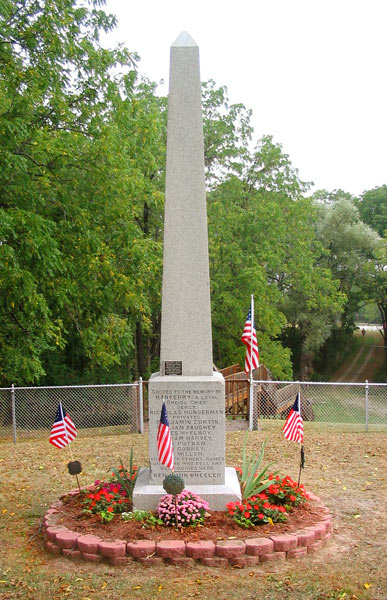 Today there is a small park with a monument at the site the ambush outside of Groveland, New York. The monument lists the names of the soldiers killed.The Groveland Ambush Monument recently has had a plate added correcting Oneida Indian Han Yost (Thaosagwat) as being part of Lt. Boyd's party
Today there is a small park with a monument at the site the ambush outside of Groveland, New York. The monument lists the names of the soldiers killed.The Groveland Ambush Monument recently has had a plate added correcting Oneida Indian Han Yost (Thaosagwat) as being part of Lt. Boyd's party
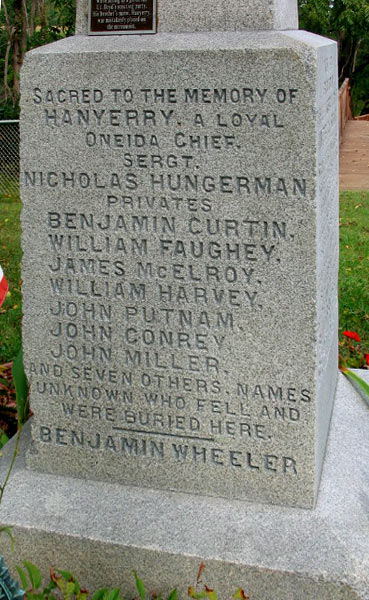

Photo of the Boyd-Parker "Torture Tree" located near the site of the Seneca Castle of Little Beards Town (present day Cuylerville ,  Town of Leicester, N.Y.) At this site on September 14, Gen. Sullivan's army found the bodies of Lt. Boyd and Sgt. Parker. A small park is now there and this tree has been documented as standing at the time of Lt. Boyd and Sgt. Parker's death. It is noted that this was also the farthest point west that Gen. Sullivan's army marched. On September 15, 1779 the army began their return march.
Town of Leicester, N.Y.) At this site on September 14, Gen. Sullivan's army found the bodies of Lt. Boyd and Sgt. Parker. A small park is now there and this tree has been documented as standing at the time of Lt. Boyd and Sgt. Parker's death. It is noted that this was also the farthest point west that Gen. Sullivan's army marched. On September 15, 1779 the army began their return march.
Below are the grave makers of Captain Boyd, Sargent Parker, and Han Yerry, Indian Scout. A large boulder with a plaque attached list those that died in the battle and torture.


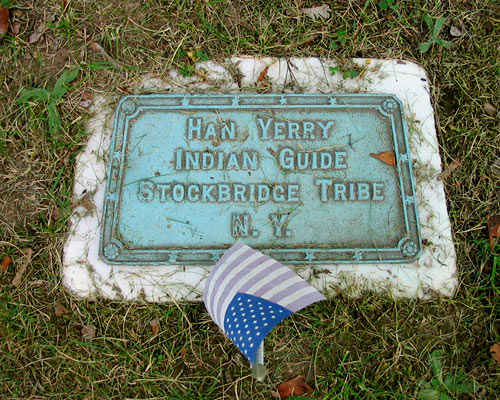
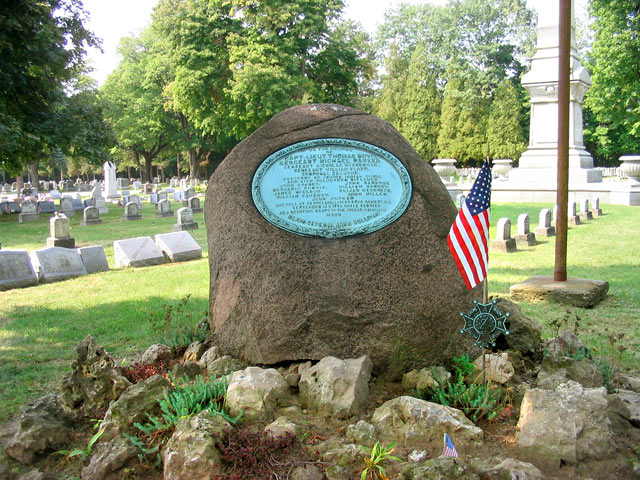
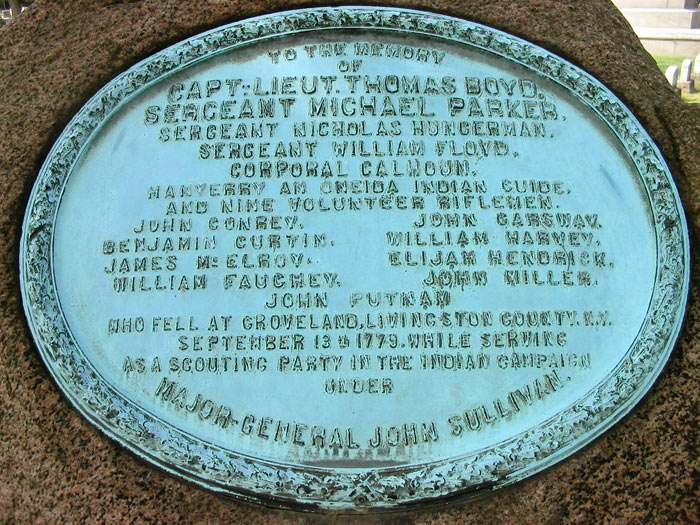
Sources used:
Conover, George S. (editor), Journals of the Military Expedition of Major General John Sullivan against the Six Nations of Indians in 1779 with Records of Centennial Celebrations, Auburn: Knapp, Peck & Thompson, 1887.
Fischer, Joseph R., A Well Executed Failure, The Sullivan Campaign Against the Iroquois, July-September 1779, University of South Carolina Press, http://www.captainselinscompany.org/images2/Boyd-2.jpg1997.
Hammond, Otis G. (editor), Letters and Papers of Major-General John Sullivan, Continental Army, New Hampshire Historical Society, Concord, N.H., 1939.
The Sullivan-Clinton Campaign in 1779, Chronology and Selected Documents, University of the State of New York, Albany, 1929.
Williams, Glenn E., Year of the Hangman, George Washington's Campaign Against the Iroquois, Westholme Publishing, Yardley, Pa., 2005.
Revised December 2008
Steve Collward